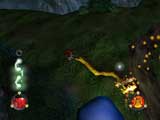 Nightcaster has inspired me
to rekindle an old burning desire of mine, a tiny flame that I extinguished long ago as a
child in some brief moment of poor judgment. Poetry writing. The poetry in Nightcaster has
taught me an important lesson, two of them in fact, which I will convey to the next
developer I run into. 1. "Let’s read some poetry at the beginning of each act to
add a little ambiance," is, for the most part, a bad sentence to hear during the
development of any game. 2. If that sentence is followed somehow by, "So any of you
guys know how to read in an Irish accent?" then things are not looking up. Not in a
long time have I seen such bad poetry in a published medium, the worst of which appears in
the first opening sequences. Luckily, Nightcaster’s developers are much better game
designers than they are poets, making Nightcaster the best game out on the Xbox in its
particular fantasy/action/adventure genre; a category that before now only had Azurik to
claim in its folds. Nightcaster is a basic, middle of the line game with pretty graphics,
relatively entertaining, yet repetitive game play, and blotched story development that
should not be confused in any way with an RPG. Not without its merits, Nightcaster
isn’t a game that will be winning a great number of awards, but it may serve until a
better game comes along to satisfy that curious little itch many of us have for magic and
monsters and plain-cut good versus evil wizards and warlocks. The game works in a niche
filling function.
Nightcaster has inspired me
to rekindle an old burning desire of mine, a tiny flame that I extinguished long ago as a
child in some brief moment of poor judgment. Poetry writing. The poetry in Nightcaster has
taught me an important lesson, two of them in fact, which I will convey to the next
developer I run into. 1. "Let’s read some poetry at the beginning of each act to
add a little ambiance," is, for the most part, a bad sentence to hear during the
development of any game. 2. If that sentence is followed somehow by, "So any of you
guys know how to read in an Irish accent?" then things are not looking up. Not in a
long time have I seen such bad poetry in a published medium, the worst of which appears in
the first opening sequences. Luckily, Nightcaster’s developers are much better game
designers than they are poets, making Nightcaster the best game out on the Xbox in its
particular fantasy/action/adventure genre; a category that before now only had Azurik to
claim in its folds. Nightcaster is a basic, middle of the line game with pretty graphics,
relatively entertaining, yet repetitive game play, and blotched story development that
should not be confused in any way with an RPG. Not without its merits, Nightcaster
isn’t a game that will be winning a great number of awards, but it may serve until a
better game comes along to satisfy that curious little itch many of us have for magic and
monsters and plain-cut good versus evil wizards and warlocks. The game works in a niche
filling function. 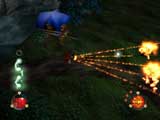 As a young child you are offered the opportunity to learn the
magical arts by a mysterious glowing orb, but doing so ages you prematurely, turning you
into an elderly, bitter old man long before your natural time. When you return to the home
from which you vanished many long years before, you find your friends gone, your
parent’s slain, and a dark force creeping across the land in the form of a creature
known only as Nightcaster (and all this time you thought you were the one the game
was named after...). Living up to your new found power, you set out to destroy this evil,
to make it once again safe for the birds to sing, snails to inch, and other generally
altruistic things to happen. And so it begins...
As a young child you are offered the opportunity to learn the
magical arts by a mysterious glowing orb, but doing so ages you prematurely, turning you
into an elderly, bitter old man long before your natural time. When you return to the home
from which you vanished many long years before, you find your friends gone, your
parent’s slain, and a dark force creeping across the land in the form of a creature
known only as Nightcaster (and all this time you thought you were the one the game
was named after...). Living up to your new found power, you set out to destroy this evil,
to make it once again safe for the birds to sing, snails to inch, and other generally
altruistic things to happen. And so it begins...
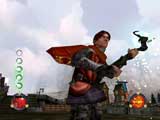 Your character is controlled through two perspectives, best described as the
combat and non-combat views. Combat view is used the most, a top down perspective that
allows you to aim your spells in any direction you want no matter which way your character
is facing or moving. Non-combat view is an over the shoulder camera perspective that is
too touchy to be of much use to the player, and it doesn't allow you to aim very well.
Since very little of the game is not spent in combat, very little of the game is spent
looking over a shoulder. I found that I almost never used the multiple views.
Your character is controlled through two perspectives, best described as the
combat and non-combat views. Combat view is used the most, a top down perspective that
allows you to aim your spells in any direction you want no matter which way your character
is facing or moving. Non-combat view is an over the shoulder camera perspective that is
too touchy to be of much use to the player, and it doesn't allow you to aim very well.
Since very little of the game is not spent in combat, very little of the game is spent
looking over a shoulder. I found that I almost never used the multiple views.
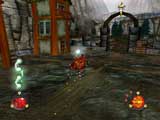 You
aim your spells through a floating orb that you control with your right analog stick, and
move your character with the left, allowing you to dodge and aim simultaneously. This
works well, comes naturally to your fingers, and makes it easy to become a Nightcaster
expert in a relatively short period of time. You’ll have numerous spells to choose
from as you progress into the game -- finding them is what keeps you playing -- but
you’re only allowed to keep four of them immediately available at a time. These four
you can cycle through with your left trigger, and the others you access with the start
button. Needless to say, one or two more spots for active spells would have been nice.
You
aim your spells through a floating orb that you control with your right analog stick, and
move your character with the left, allowing you to dodge and aim simultaneously. This
works well, comes naturally to your fingers, and makes it easy to become a Nightcaster
expert in a relatively short period of time. You’ll have numerous spells to choose
from as you progress into the game -- finding them is what keeps you playing -- but
you’re only allowed to keep four of them immediately available at a time. These four
you can cycle through with your left trigger, and the others you access with the start
button. Needless to say, one or two more spots for active spells would have been nice.
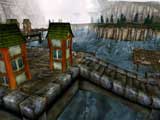 As a third person action adventure, Nightcaster does make things interesting in
several ways. Magic is the only fighting medium at your disposal. No swords, no bows,
nothing except you, your orb, and four regenerating schools of multicolored magic with
which to tear the world apart. While it’s nice to see a game focus on magic over
melee combat, allowing for many, many cool visual effects, it does mean that there is no
neat armor to pick up, or healing potions, or any of the other items so common in a
fantasy universe. In fact, aside from a few ruins and crystals that you pick up along the
way, additional spells are the only objects you’ll acquire. You don’t receive
points as you defeat creatures, and there is no upgrading of skills aside from a few
preset level-ups that happen at certain points in the story line. Ninety percent of the
game is a matter of getting from one side of the map to the other. As I said, RPG it is
not.
As a third person action adventure, Nightcaster does make things interesting in
several ways. Magic is the only fighting medium at your disposal. No swords, no bows,
nothing except you, your orb, and four regenerating schools of multicolored magic with
which to tear the world apart. While it’s nice to see a game focus on magic over
melee combat, allowing for many, many cool visual effects, it does mean that there is no
neat armor to pick up, or healing potions, or any of the other items so common in a
fantasy universe. In fact, aside from a few ruins and crystals that you pick up along the
way, additional spells are the only objects you’ll acquire. You don’t receive
points as you defeat creatures, and there is no upgrading of skills aside from a few
preset level-ups that happen at certain points in the story line. Ninety percent of the
game is a matter of getting from one side of the map to the other. As I said, RPG it is
not.
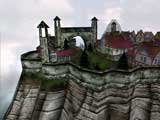 Monsters
are divided up into four colors, each representing a different style of magic. Blue, red,
yellow, and purple: water, fire, light, and dark. Similarly, your magic comes in those
same schools, with a variety of spells coming in each color, sort of like rock candy.
Naturally, fire spells work better on water creatures, light on dark, etc. You can even
elect to make a certain school more powerful than the others. Sadly, this is a wasted
feature, as rarely does the game ever present you with anything but a hodgepodge mix of
creatures at any one time. Declaring a water allegiance might make sense if entering an
area dominated by fire creatures, but such an opportunity never really appears. Instead,
each area seems to have an about equal mix of each type of creature, all of which will
attack you at the same time. Combat often dissolves into a process of killing all the
monsters you can with one color spell, running away, switching spells, and then returning
to kill some more. Since the majority of the monsters you encounter are the same
throughout almost every level, even after preprogrammed power-ups, combat grows dull very
quickly.
Monsters
are divided up into four colors, each representing a different style of magic. Blue, red,
yellow, and purple: water, fire, light, and dark. Similarly, your magic comes in those
same schools, with a variety of spells coming in each color, sort of like rock candy.
Naturally, fire spells work better on water creatures, light on dark, etc. You can even
elect to make a certain school more powerful than the others. Sadly, this is a wasted
feature, as rarely does the game ever present you with anything but a hodgepodge mix of
creatures at any one time. Declaring a water allegiance might make sense if entering an
area dominated by fire creatures, but such an opportunity never really appears. Instead,
each area seems to have an about equal mix of each type of creature, all of which will
attack you at the same time. Combat often dissolves into a process of killing all the
monsters you can with one color spell, running away, switching spells, and then returning
to kill some more. Since the majority of the monsters you encounter are the same
throughout almost every level, even after preprogrammed power-ups, combat grows dull very
quickly.
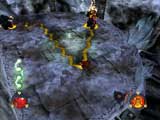 When the combat runs thin, there really isn’t anything left to save
Nightcaster, and smaller nuisances appear. The pause feature is a good example. When you
press the pause button, your character undergoes a neat little animation in which he
throws a book containing the option settings up into the air. While it freezes your
character in place, and keeps him from casting spells or running away, your enemies still
have a full rein of motion for a few seconds after you pause the game. I died at least
once in a very bad place because the phone rang, and my character was munched to death
while searching for that menu book in the inside pocket of his robes. That one death was a
small bother, but after playing the same combat fight after fight, it really bothered me.
When the combat runs thin, there really isn’t anything left to save
Nightcaster, and smaller nuisances appear. The pause feature is a good example. When you
press the pause button, your character undergoes a neat little animation in which he
throws a book containing the option settings up into the air. While it freezes your
character in place, and keeps him from casting spells or running away, your enemies still
have a full rein of motion for a few seconds after you pause the game. I died at least
once in a very bad place because the phone rang, and my character was munched to death
while searching for that menu book in the inside pocket of his robes. That one death was a
small bother, but after playing the same combat fight after fight, it really bothered me.
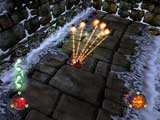 Saving
is handled by save points, small fairy rings that glow a green and yellow ambient in the
dark of the night. Luckily, these are not far apart, and death is rare enough that it
wouldn’t be a problem if they were. Occasionally you’ll find yourself postponing
super until you can turn off the Xbox, but it’s only rarely annoying. Once, and only
in a specific location, Nightcaster forced me to re-kill certain enemies every time I
reloaded even though I saved after their deaths. Still, considering some of the
frustration I’ve had with point-dependent save features in the past, Nightcaster
keeps everything to a relatively cordial and nonviolent relationship.
Saving
is handled by save points, small fairy rings that glow a green and yellow ambient in the
dark of the night. Luckily, these are not far apart, and death is rare enough that it
wouldn’t be a problem if they were. Occasionally you’ll find yourself postponing
super until you can turn off the Xbox, but it’s only rarely annoying. Once, and only
in a specific location, Nightcaster forced me to re-kill certain enemies every time I
reloaded even though I saved after their deaths. Still, considering some of the
frustration I’ve had with point-dependent save features in the past, Nightcaster
keeps everything to a relatively cordial and nonviolent relationship.
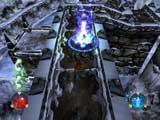 Graphically, Nightcaster has some of the most impressive spell-throwing out
there. The design team has done an excellent job of creating interesting and explosive
effects for many of the numerous spells that you’ll collect along the way, complete
with glowing runes and ground-splitting lighting. Unfortunately, the rest of the game is
far less impressive. The scenery takes after The Nightmare Before Christmas, with
buildings that tower at odd angles, curving thatched roofs, and so forth, but is
unchanging, and made to look uniform by the games use of lighting. It would have been nice
to play a few levels not clocked under the ever-present blanket of darkness that soaks the
game. Very little of the scenery is interactive, buildings remain locked and hollow
objects that turn transparent when you come too close, and you find yourself quickly
ignoring it all as you grow more and more intent on merely finishing the game. The world
is all flat, meaning that you can’t fall off of edges, but also that you can’t
jump over rocks, can’t climb over trees, or any other activity most people take for
granted. There is almost no character interaction, except for a few plot movers that stand
in one place and repeat the same rhetoric every time you come within hearing range.
Graphically, Nightcaster has some of the most impressive spell-throwing out
there. The design team has done an excellent job of creating interesting and explosive
effects for many of the numerous spells that you’ll collect along the way, complete
with glowing runes and ground-splitting lighting. Unfortunately, the rest of the game is
far less impressive. The scenery takes after The Nightmare Before Christmas, with
buildings that tower at odd angles, curving thatched roofs, and so forth, but is
unchanging, and made to look uniform by the games use of lighting. It would have been nice
to play a few levels not clocked under the ever-present blanket of darkness that soaks the
game. Very little of the scenery is interactive, buildings remain locked and hollow
objects that turn transparent when you come too close, and you find yourself quickly
ignoring it all as you grow more and more intent on merely finishing the game. The world
is all flat, meaning that you can’t fall off of edges, but also that you can’t
jump over rocks, can’t climb over trees, or any other activity most people take for
granted. There is almost no character interaction, except for a few plot movers that stand
in one place and repeat the same rhetoric every time you come within hearing range.
The rest of the plot is brought forward by the occasional cut scene, bad introductory
poetry at the start of each level, and small books that you’ll find amongst the brush
on the side of the road. The books are boring and do nothing to bring the reader into the
game. Cut scenes can’t be skipped. What little interesting story line there was at
the start, a young boy returning as a wizard years after his disappearance, is crippled by
lack of development. Specifically, your parent’s are killed before your return,
eliminating the need for reunion and some bad voice acting, and your two childhood friends
flee the scene before you arrive. The only chance of an interesting plot twist, a possible
love triangle, is essentially sewn shut by killing off the only other male in the game,
your best friend, prier to your being reunited.
When it boils down to it, Nightcaster carries a list of small complaints. Life force is
too sparse. You can pound a bad guy for ten minutes without any sign of damage before he
keels over dead. The repetitive yelling when casting spells. Your flying orb needs stairs.
Walls will lock your character in place just by touching them. At times, you simply grow
bored. Nightcaster is a good example of what happens when developers make a game with no
glaring errors. Most of the difficulties are minor and unimportant glitches that
don’t really interfere with the basics of the game. While there are no spectacular
failures, there are no spectacular successes either. The elements that make a game fun are
sparsely sprinkled into the world the Nightcaster calls home, a place that you’ll pay
good money to visit for a while. In the end, Nightcaster isn’t a bad game; it just
doesn't carry a lot of weight in an industry that needs a solid punch in order to stand
out. Aside from the fact that it is one of the first to try to satisfy our desire to play
in the role of the wizard come to save the day, Nightcaster isn’t a game that offers
a great deal. It will be hard to notice in a year or two when other games, games that not
only fill niches but create them, have come onto the market.
